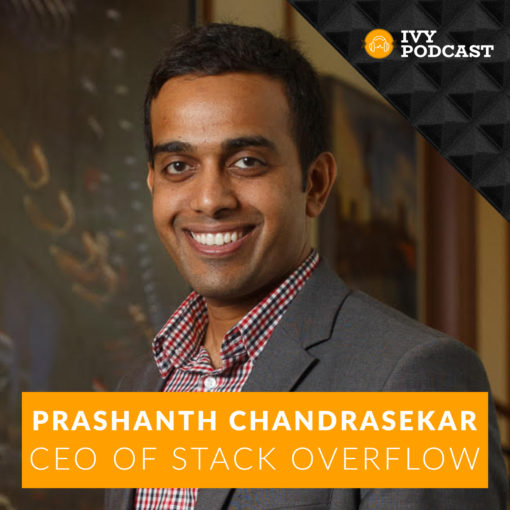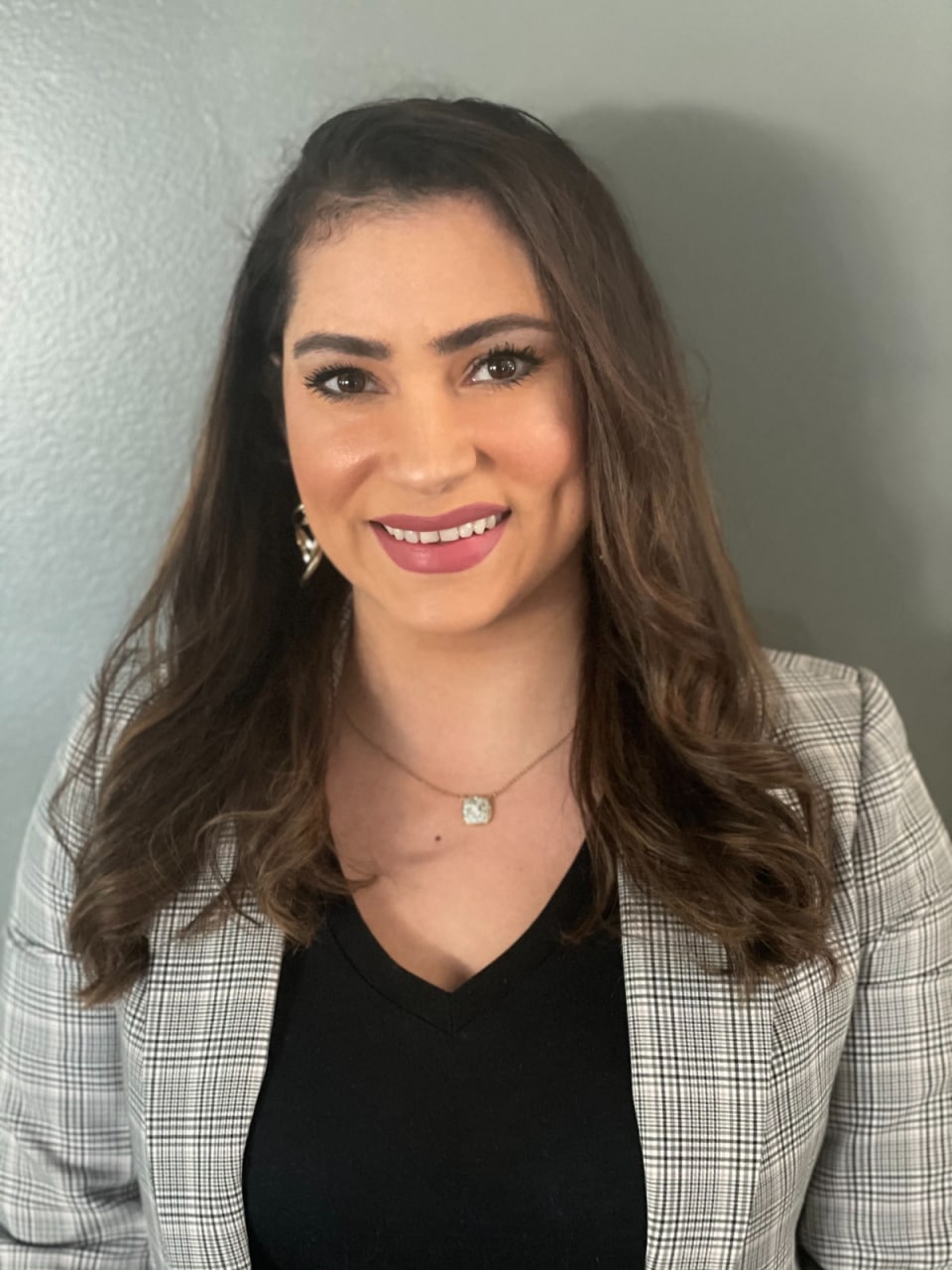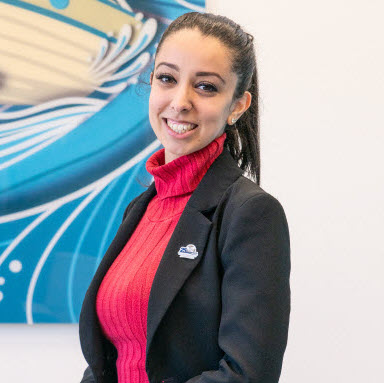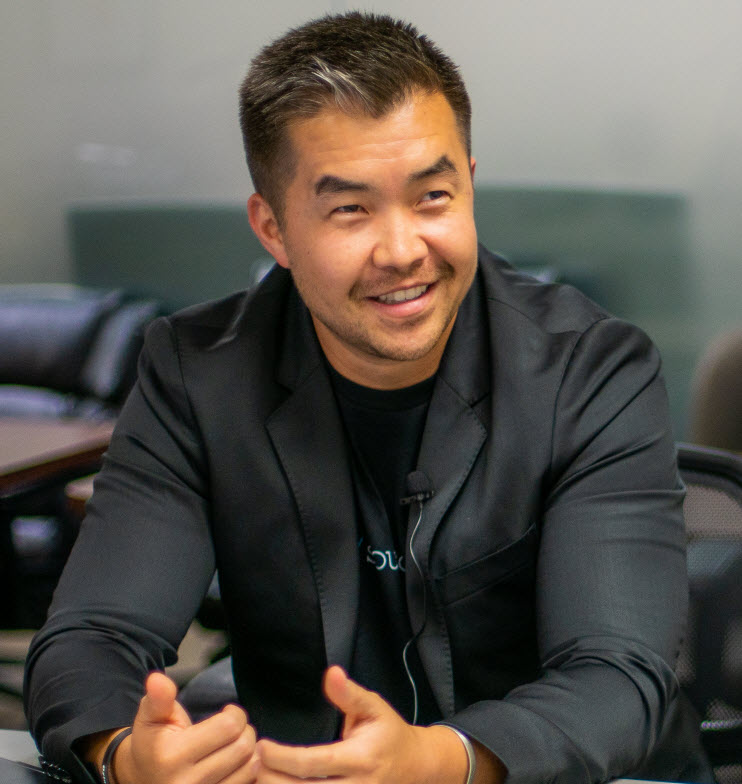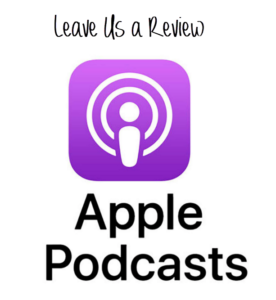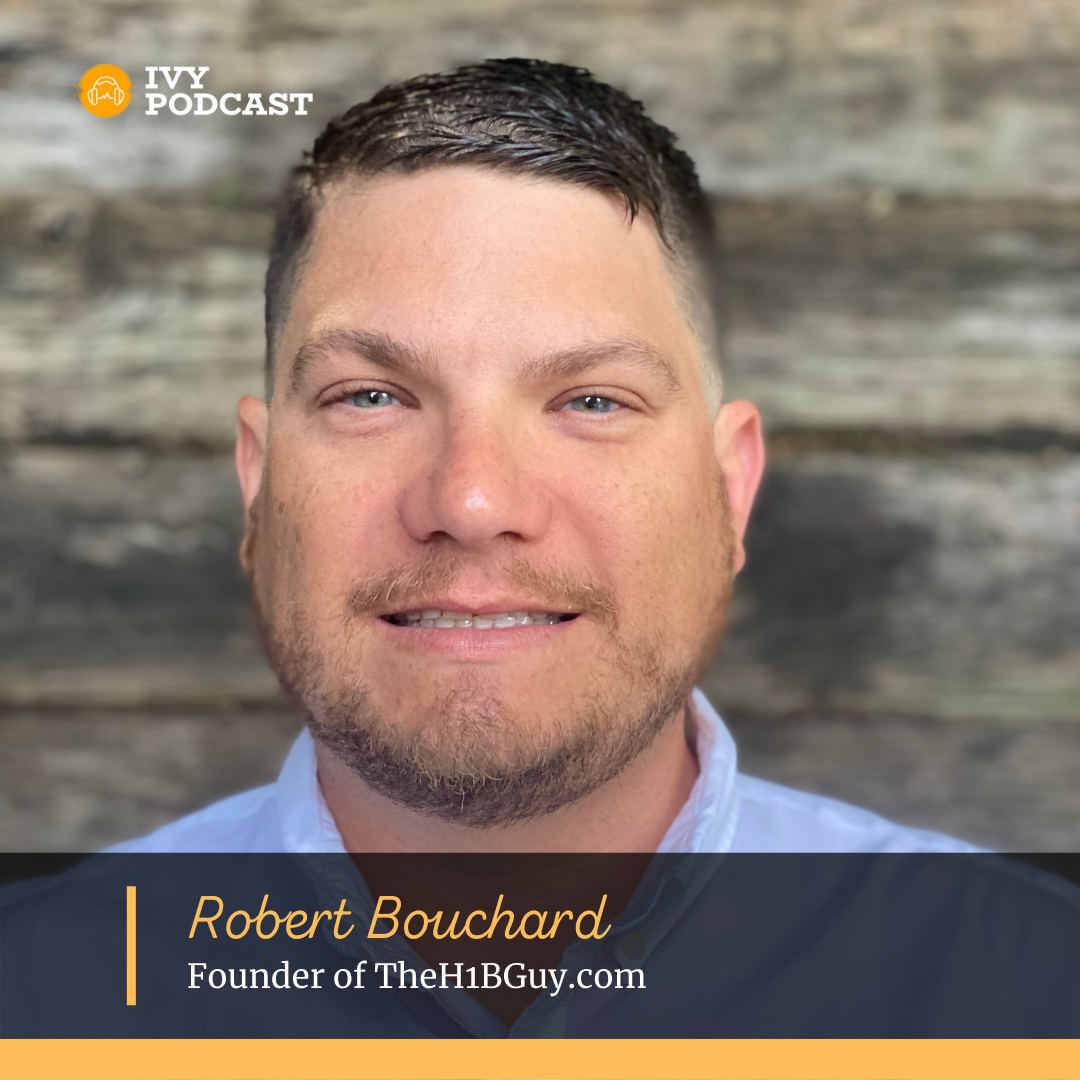
Robert has established himself as a thought leader on immigration. He has implemented multiple programs surrounding work authorization, third party process, and international recruitment strategies during his 15 year career in the private sector. Launching TheH1BGuy.com in June 2020, Robert consults with employers and employees to help maintain compliance and implement automated processes surrounding employment based preferences. He posts weekly content to his Blog and YouTube channel where he covers News, Education, Advice and Reform discussions on the H1B Visa and other immigration benefits.
Episode transcription:
[00:00:27] Angela Alberty: [00:00:27] Okay. Super excited about our show today. I am speaking with the H-1B guy, Rob. I'm so excited to have you today. Let the audience know a little bit about yourself before we get started. [00:00:40] Robert Bouchard: [00:00:40] Well, hey Angela, thank you for having me on today. Really excited. My name is Robert Bouchard. I am the H-1B guy. I grew up in a small town called Brunswick, Georgia on the coast of Georgia, went to a Georgia Southern university in Statesboro and made my way to Atlanta. And in the early 2000s kind of found myself and technology and then recruiting. And then here I am today, the H-1B guy, so really excited to, to jump on today. [00:01:11] Angela Alberty: [00:01:11] Awesome. H-1B the world of work visas and immigration policies. But before we get started and dive into the nitty gritty, I want the audience to get to know you just a little bit better. You gave us a great introduction. We know you're a Georgia boy and where you were born and raised, but let us know. What's a hobby of yours. [00:01:31] Robert Bouchard: [00:01:31] So I have this really weird obsession with Walt Disney world. I don't know why I just loved music and definitely very avid sports: golf, tennis coaching, my kids and youth sports. So really keep busy outside, try to stay as active as possible. [00:01:53] Angela Alberty: [00:01:53] Okay, so you sound like the perfect dad, Walt Disney and avid sports and coach. Yeah. [00:02:00] [00:01:59] Robert Bouchard: [00:01:59] No, I don't want to say no to adventure. Let's just leave it at that. [00:02:05] Angela Alberty: [00:02:05] Right. So if you could choose anything, what would your last meal be? [00:02:07] Robert Bouchard: [00:02:07] Yeah, I guess I'm a barbecue guy, right? So, if it had to be one protein, I have this hankering for smoked chicken with white sauce. And a lot of folks don't know what white sauce is. They kind of grew up in Alabama and it's very regional. It's like a Manet's vinegar based sauce. And yeah, I'd say that with some greens and maybe some Mac and cheese, I think that would fill me up. [00:02:42] Angela Alberty: [00:02:42] Right. Good old Southern boy. I love it. Love it. Okay. If you could have any dream job in the world, what would it be? [00:02:49] Robert Bouchard: [00:02:49] Yeah, I grew up with this dream of being a professional golfer. Unfortunately I didn't want to practice or work hard enough to get there. I was pretty good, but those guys, they live a very privileged life, but they do so because they are the best at what they do in the world. And yeah, I think for me, you look at what goes into being a professional golfer, the time, the dedication, the travel, but they see every corner of the world. And for me, that was always something that I dreamed about. [00:03:22] Angela Alberty: [00:03:22] Yeah. It takes a lot of dedication, but pretty cool. I think a lot of guys have out there, some kind of professional sports player. I know my husband does as well. So congratulations. You survived the round of fire and the ice questions. We got a chance to get to know you a little bit better and break the ice. But now let's delve into who you are. So tell us a little bit about your story and how you became the H1B guy. [00:03:46] Robert Bouchard: [00:03:46] Yeah. As I mentioned earlier, I graduated from Georgia Southern university, 2003, and my first job out on the street was selling credit card machines. And then I had a company that was a technology based company, they gave me an opportunity to really beat up the phones inside sales. And I took this interest into systems and networking and was like, wow, this is pretty cool. Technology is amazing. And what it does. And I worked for that company for a while. And then I got into doing recruiting for them. They had some needs and I helped them out. And all of a sudden I realized, wow, there's some big money to be made in these agency recruiters. I had met some people just through networking and realized the kind of money that they were making. So I took the jump to agency and I did that for 15 years and worked for a couple of different agencies and had the opportunity to be introduced to corporate core based business, which is subcontracting based business and staffing, and started to take this interest into the different types of visas and understand standing it and to have the opportunity to manage a large immigration program that basically we built from the ground up that at one of my former employers. And then, like a lot of people, I think March, March 15th, 2020, was kind of the day that a lot of our worlds changed overnight. And I was fortunate enough to be in a position to kind of survive over the next few months. But like a lot of organizations, companies are out there, we're trying to figure out how to cut costs and keep the lights on. And so ultimately staffing business was impacted pretty swiftly. And a lot of that was the contingency based staffing, which is what I have done for a large part of my career. And I was hoping for a lead delivery strategy over a very large enterprise account and that account was impacted significantly. And so my role was impacted right before Memorial day and in hindsight at the time, wow, it was a bit of a shock. I can't say that like a lot of us didn't foresee it. But what I decided after that was like, I'm going to take Memorial day off and just kind of on plug right. And decompress what's going on. And so, fast forward, three weeks later, really mid-early June, I had this vision of the concept of the H1B guy come to me. And what I realized is that I have this very unique skill set and staffing and in business in general, which is I understand the inner workings of the temporary foreign worker and the various work authorizations that go along with that. And I also understand the relationships between third party subcontractors and firms and how they manage human capital flow. And so, I started looking out there and I'm like, well, the only people that are really talking about this are folks that are on these work faeces and attorneys. And I said, wow, there's a gap in the market. And quite honestly, I love to talk. I love to write. And I said, what? I know I can help businesses solve problems and I have a lot of relationships. And so I'm just going to put myself out there. And I took a couple of weeks, created the H1Bguide.com. Did everything with my iPhone 11 and a Chromebook. And so I could get some revenue going and afford to buy the laptop that I now use. And it says by piece, like when I started shooting my YouTube videos, I was using an industrial work-life. But what I realized is it doesn't matter what your setup is or how much you invest in it, it's to get quality content out there. Right. So I started talking about this H1B visa, but I quickly realized, wow, this is much bigger than H1B visa. There's all these other types of work authorizations out there. And then in the news in July, was this Senate bill. SB 86, which was part of removing the green card backlog, removing country caps for employment based preferences. And all of a sudden my political sort of interests overlap with my professional and I had a platform and I рave this voice that wow, just very quickly, in a matter of 30 days, I started getting all these messages to these people saying, thank you for talking about this, thank you for bringing this story to light. And I'm like, wow, this is really something that I'm on and to back that up, I put myself out on LinkedIn, which is where you and I found each other. And I had a client that reached out to me day one that said, I need your help and I need it now. Can I talk to you tomorrow? And I said, I said to myself, Angela, wow, you're onto something. And so that's where the H1B guy was born [00:08:52] Angela Alberty: [00:08:52] Yep. Boom. So we dedicate 15 years to staffing. All of a sudden found yourself in the middle of a pandemic laid off and you made yourself into somebody and you're right. That's exactly how we met. You've gotten sick. You've gained quite a bit of traction. So I'm super excited to talk to you about this because we look at H1B and work visas. I've been in staffing. Most of my career. I know I've been on the phone with the people that were holding the visas. When people try to get those people to get to work. I know that there's a lot of relevancy, particularly in the white collar world. When you look at it, engineering, and STEM and STEM work. And there's relevancy behind this population. So tell us a little bit about that candidate experience and what has led them to the options that this type of worker is limited with. [00:09:40] Robert Bouchard: [00:09:40] Yeah. I think, for any of us who have spent any time and staffing, or just as an employer or a business owner that is looking to hire. Because at the end of the day, that's really what we're talking about is human capital H1Bs just happened to be temporary foreign workers in that human capital designation. And so what happens in the physical is that there are tech startups. And then there were these large enterprise organizations that decided we're going to implement this very niche technology into our platform. And so when they make that decision, a lot of times in that process, they don't realize what they have to do to recruit, attract, and hire. The person who can implement it, if it's not some sort of managed services agreement that they have in place with a team of developers, that's going to come in and do it. So when they try to augment their staff, they have positions that go unfilled for a very significant amount of times, right. That kind of time to fill. And so jobs are left on open they're, left on work. And what I realized very quickly is that if you can build a network within this pool of candidates. They're much more likely to refer you to somebody just because they're always looking out for their friends because they know they have to maintain status. Right. And so what I realized is that H1B still, this very sort of niche gap and a lot of high-tech space and a lot of its development, a lot of it, or these one-off systems that have their own sort of code behind it. And the reason being is that they are trained very early on in technology. Whereas when we go through school, it's a lot of liberal arts. It's a lot of social skills and things like that in US history. Right. And not that those things aren't important, but we're not, we're not only more recently is technology becoming part of the learning institution in US schools. And so that's where the gap was created, right? Is that there aren't enough high tech. Resources to fill the high tech needs and large enterprises and tech startups. And so what happened is, if you have this shift starting in the late 1990s, early two thousands, and the H1B lottery and the excess of visas that was added in the early two thousands. It created this significant influx of inbound individuals, specifically from India and China. [00:12:15] Angela Alberty: [00:12:15] Wow. Interesting. So let's go into the next question then. It let's say you go to sleep and you wake up and you're all of a sudden in your dream world, what do you think would be the most significant impact that we could apply starting tomorrow to help this H1B and the H1B lottery process for this very untapped part of the worker candidate pool. [00:12:40] Robert Bouchard: [00:12:40] So H1B has come with a pretty restrictive employment process. And so there's two ways that individuals can be awarded in H1B, there's exempt and then there's non-exempt so exempt means that they work for a nonprofit institution. Thank medical doctors, nurses. Things like that, where researchers where they're not the company they work for has a non-profit designation. And so they are cap exempt, meaning that the employer can petition for their H1B at any time during the year, as long as they have the appropriate documents, then there is the non-exempt. And so that means that you have to be awarded through the lottery. And each year there are 85,000 H1B visas that are awarded in the annual age when the lottery that's selected and opened on April 1st. And so you have two different pools that they pull from 65,000 that are generally pooled from foreign nationals with bachelor's degrees outside of the US. And then you have another 20,000, which is advanced US degrees. So foreign nationals who've come here and gotten a master's degree in the US. And so for a very long time, it was random selection and what would happen and what a lot of the large outsourced employers have learned is that they flood that lottery with multiple petitions. The more petitions they submit, the higher probability, they would have to be selected, almost gaming the system, if you will, versus a small employer who maybe has two needs and submit two cases, but only gets one. And what is it this created is really no rhyme or reason other than random selection. Well, one of the things that's been in the news recently is the wage rule changing the way the H1B lottery will be selected this year. And so what the new rules States and this has been contested, and there are some questions about being debated, but I think this is a step in the right direction because what it will do is in turn, make the H1B lottery based on wages. There is no more random selection to it. So employers who are willing to pay H1Bs, the most salary, right, are going to be the ones who are going to be selected. And so what that ends is the cheap labor debate. It ends the displacement of American workers debate. It basically says that I'm willing to pay this for a national more, then market value more than the prevailing determination so that I can get this resource here on us. Soil, because I need to fill this position versus large outsourcers that are submitting two, three, four, 5,000 position petitions and getting half of those. Right? Because last year I believe the number was 275,000 petitions for the lottery US received for 85,000. So those numbers don't line up. [00:15:40] Angela Alberty: [00:15:40] Okay. 5,000 petitions, 85 of those actually get approved. Some of which are coming from bachelors in those countries. Some of them are getting their master's here, but that wage limit, you think that you see that as a major improvement, at least a step in the right direction. [00:15:55] Robert Bouchard: [00:15:55] That's correct. I'd say 90% of H1Bs that are here, 9 out of 10 that are here currently working in the US that are mired in the screen card backlog that we'll talk about, but what they would tell you that they are in favor of this because what it shows is their value is based on their merit and skill it's based on what they're paid. It's not based on a random selection of, hey, you meet the specialty occupation requirements, but I only have to pay you $75,000 because that's the prevailing wage determination for that position. What that means is that the department of labor states that these are the minimum salary that you would pay that individual. And so the lottery based on the actual employer or offer letter that States the wage that's entered electronically and selected based on that would end a lot of this. [00:16:56] Angela Alberty: [00:16:56] Wow. Okay. So you may have mentioned some of this, but now we're headed into a new administration. We've got Biden on the radar to become president. We know some of the steps back, or at least things that didn't advance us as far as it could with Trump. But what do you see as some of those other improvements taking place under this potentially new administration to look like with Biden? [00:17:17] Robert Bouchard: [00:17:17] Yeah, I think. As I just mentioned about the H1B lottery wage level, this was something of a proposal for rulemaking that the Trump administration just put in going back to November. And so this is kind of their parting shot. They, the announcement came out last week from us, CIS that it would be implemented, but this is actually a very big feather and the Trump administration's cat, I think where they missed the Mark is he ran on merit based immigration in 2016, we saw the raise act come into the Senate, the cotton bill is I refer to it in 2017 and then we didn't hear anything after that. And it was more of an assault on the temporary foreign worker, I think, with the new administration coming in. You'll see the president alive. Biden's soon to be president Biden comes in and starts to resend some of these executive actions. I don't know how many, and I don't know how much he's going to go towards the H1B. I think he may just kind of sit back and let some of these happen. What I really believe happened and if it's going to happen. And if you read a lot into what the transition team is saying is that I believe that we'll see new legislation through Congress come up. And I predicted that a few weeks ago, June or July by July, I think we'll see some new immigration legislation. That's gonna have some carry over language from Senate bill three 86 that I mentioned. And a couple of those big things that relate to the H1B visa employee are the 50-50 rule, which says that if lawyers have 50% or more H1Bs on their staff, they can no longer be awarded new H1Bs and the lottery. So that curves the H1B sort of cycle and employers who are fully reliant on H1B. That's a big one. The other one is the whistleblower penalty. So right now there really aren't a lot of pushback employment-based penalties for H1B. Employees that are willing to speak up when they know that there's known fraud. And so that's another big sort of protection for H1B. Of course, back in August when the Biden administration put out their policies on immigration very way down in the bottom, he talks about, he doesn't agree with country quotas for employment based preferences. And for those who aren't familiar, there are 140,000 employment-based preference green cards issued every year, but there is a 7% cap on your country averse. So that it means that if you are from the United Kingdom and your employer sponsors you, there's a 7%, only 7% of those hundred and 40,000 can be awarded to individuals from the United Kingdom. So when you go back and look at, as we talked about 70% of H1Bs are from India and this pipeline and cycle that it's created, think about the number of individuals from India that are mired in this backlog. And so I think you'll see the Biden administration target removing the country cap quotas. I also think that they will come up with some different transitions for removing the green card backlog. So all of this and how it impacts our staffing world is that at some point transitioning in the next five or so years, we are going to see a plethora of H1B employees that did not have W2 freedom, meaning they couldn't really pick who they wanted to work for, where they wanted to work and how much they wanted to be paid, because a lot of that was mandated by law. You'll see them start to hit the market. And what that's gonna do is it's not necessarily going to create an influx of human capital, but what it is going to do is make them more highly skilled. Individuals with years of US experience, start to look and see is there something else I want to be doing? And so what's so big about clearing this backlog is that it will help us move forward. And that war on human capital, because right now they're in a cycle and they don't have freedom. So big advances coming our way. [00:21:33] Angela Alberty: [00:21:33] Let me see if I could recap it. So we've got the wage, the wage merit, and getting the visas that way we've got the cap happening. So any employer over 50% ratio will be limited, we've got some major changes headed with Biden and what he plans to do with visas. And as we're coming up on time, it looks like we've got about time for about two more questions, but as an employer, what do you need to do to remain attractive to this candidate pool? And what are some investments that you can make? If you have the need to get some of these types of workers out on your payroll and working for you? [00:22:15] Robert Bouchard: [00:22:15] So, I think a couple of things are the war on capital that's happening is also borderless. And so I think that's the bigger thing is that right now people are sitting anywhere they want and to see in the US and also in the world. And so I think giving your employees that freedom to choose where they want to work and, and when. It is really big and the new society that we have. But I think if I'm a company I'm looking to hire H1B visas, I'm going to want to do a couple of things. First of all, I want to make sure I have a really good immigration attorney on retainer is number one. You have to have it, whether you are going to hire one or you're going to hire 50, you've got to have a great immigration attorney. Second, you've got to have a compliance process in place because what you don't want is ice walking through the door, asking me for documents on certain employees and you cannot produce them. That's a big no-no. So at the end of the day to attract this type of employee, what you have to do is make them feel wanted. And how do you do that? You do that through paying them a fair wage above market value in many cases. So money, right? It is a huge influence. The other way that you do that is giving them that path to permanent residency. So that would be employment based green card sponsorship. I can tell you, in all of my years of working with H1B employees that have been here in this country for two, three years, they're two motivators. Generally money and green cards. The third one would be, they're going to learn a new technology or skill, right? And then the fourth is who the employer is for the resume, that name recognition. And so if I'm an employer and I'm looking to build these programs, I want to make sure that I'm going to start. So it's like you're baking a cake at the very bottom level to tear yourself up. I'm going to identify who the immigration attorney is that I'm going to use. I'm going to bring somebody like me on to help guide them in that process and make sure that their compliance is in place, that they have all of the appropriate processes in place before they even get to thinking about bringing in H1B onboard. And then when you get to that point, it's going to be money. Your commitment to their permanent residency, the technology they're going to get to work on and who you are and where you're going as an employer. [00:24:45] Angela Alberty: [00:24:45] Wow, money and green card. That's where it seems to be a lot of it where it's starting to at least attract these workers along with everything else that you mentioned, perhaps investing in another skill. [00:24:54] Robert Bouchard: [00:24:54] So I think one more thing on that too. Angela, I think a lot in, and I've seen this a lot, is that the stability aspect of who you are as an employer and making them a permanent employee versus a subcontractor of a subcontractor or what we refer to as layering in our staffing world. I think that in and of itself I failed to mention that, but to me it resonates with the temporary foreign worker who is your permanent employee. It gives them purpose and I say them in the sense that as a whole, it really does. It has been proven in all of my conversations that I have, that the H1B is our permanent employees versus the H1B that are working for a consulting firm or layers. The ones that are perm are generally much happier and satisfied and where they are then than the ones that are working through consulting firms, which by default, if you're helping them obtain a green card through that retrospect. [00:25:57] Angela Alberty: [00:25:57] It's because you're offering some form of permanent employment I'd imagine. Right? [00:26:06] Robert Bouchard: [00:26:06] Correct. And investing thousands of dollars in them. Right. That's the other side of it is we're talking about thousands of dollars and investing in them. [00:26:17] Angela Alberty: [00:26:17] Right. Right. And I think we can dedicate an entire episode to one, an investment is into H1B statuses and the requirements that an employer has to uphold, because I know that that is a very complex situation in itself. But tell me if you could give one reason right on why we face a big risk, if these certain policies aren't improved, but it does seem like we're headed that way, but what's the biggest thing that's at stake. For the US worker population, if some of these improvements aren't addressed. [00:26:48] Robert Bouchard: [00:26:48] Yeah. So one of the stories that I told back in August is a really good friend of mine, who I would consider one of the top 500 best art software architects in the world. He had been here in the US for a decade. His priority date was 2012 and he wasn't seeing an end in sight. And a few years ago, he started to look at his options and he was able to navigate the system in Canada. And the system in Australia in the end, he decided to go to Australia because of a better opportunity and the climate, and quite frankly, the location in reference to India. And so the US lost on that. Our economy loss, our innovation loss. This is now someone who is doing some really cool stuff in Australia. And guess what? He could have been here doing that, but because of the way our system works, it suppresses H1B from being entrepreneurs. They can't own businesses and it traps them. They have to every time he changed employers, which he had three, I won 40 approvals because over that 10 year period, he changed employees three times. And so the cycle just continues. And so if we're going to break the cycle, we have to look at what that is that attracted him to Canada and Australia. And so I always come back to this merit based points, immigration system, which is instead of there being a random selection or just who's ever going to make the most right. That it's based on your compensation, but also other factors, your command of the English language, based on an assessment, the type of degree you have, the type of skill set, you have the type of experience you have, your spouse's merit and skills are also evaluated in that if the individual is married and the points way towards that. So what it does is it creates this huge system. Around merit and skill, because some of the things we've talked about on my channel, right now, the worst way to come to America is based on merit and skill. Think about that. The worst way to come to the US is based on your merit and skill because the navigation of becoming a permanent resident for temporary foreign workers is long and winding. Whereas countries like Canada and Australia, give them a path in two years, you're going to have this. Status in four years, you'll be eligible for this status and it's a climb up, right? It's permanent residence. It's a work visa. Then it's permanent residency, then it's citizenship. And ultimately that is to me, what ends the cycle? It ends the cheap labor debate. It ends the displacement of American workers debate. It ends this game where large outsourcers are flooding. The system with resources that may necessarily not be as qualified as they're perceived to be. Instead there's an electronic vetting system that goes into it. And at the end of the day, no, employer's obligated. It's up to that individual to come here and seek their opportunity and earn for themselves. And that when that happens, fortunately, I don't foresee this happening over the next four years, but when that happens, that's when we will win the war on human capital. [00:30:08] Angela Alberty: [00:30:08] That's fantastic and not just human capital, but the innovation of these very brilliant people bring to the market into what is a future trajectory for the US and are thriving. [00:30:17] Robert Bouchard: [00:30:17] Well, I'm thinking about that's what our country was built on, and that's the legacy that you and I have to leave for our kids is that we're gonna advance this because technology we've seen how quickly it moves. And one of the things I realized about the H1B guy and I alluded to it is that it's not just technology. I mean, there are medical doctors that are on the phone bringing lines battling this pandemic that could very easily get sick, not be able to work for 60 days and lose their work authorization, saving American lives at the risk of deportation when they came here legally, if that picture. Does it paint a horrific graphic of what's happening right now with our immigration system specifically? Employment-based I don't know what does, and if I'm an executive that I'm sitting there looking at, how do I get better? How do I hire better quality? I want to come back and know that we have a system in place that is vetting everybody, whether they're American or foreign. [00:31:24] Angela Alberty: [00:31:24] Yep. It goes back to the core. And as I told you, this subject at least speaks volumes to me as a daughter of an immigrant that came to this country and established their way here and knows exactly what that process is for her to fulfill and maintain legal work authorizations. I completely resonate with this and I feel like this is an area that we do need to address, but it does seem like there is some glimmer of hope happening at least with what's Biden proposals to do on regulation and reporting any kind of discrepancies, the caps on each country, the address of a green card and the backlog they're in. So, we're headed towards there, and it's been great having you on this show. I'd hope that we can at least dedicate another episode to perhaps more focused on the employer and what they need to do to facilitate this process. I know that lots of people are gonna have questions as we come up and publicize the podcast work. Can we get a hold of you? If there's any questions that come up as we're wrapping up today's episode. [00:32:33] Robert Bouchard: [00:32:33] Yeah, thank you. I'd love to come back again, as you can tell, I can talk for a while and I think, if I go back to, Hey, you asked me where people can find me. Well, it's at H1Bguy.com and what I want people to know is that my dream here is to continue to be recognized in the world of employment-based immigration. And so expect to hear this voice and see this face and read my writing a lot because that's where my why. And what I do is I help businesses and individuals solve complex work authorization issues and the recruitment process while also bringing awareness to employment-based issues and benefits in the immigration system. And so you can find me @theh1bguy.com. You can follow me on Twitter at the H1B Guy. Of course, please go to my YouTube channel, the H1B Guy, subscribe to it and I also have a telegram platform as well, H1B Guy channel on telegram. And so those are the best ways to find me and subscribe to the website for the latest and greatest that I put out every month on immigration and news. [00:33:49] Angela Alberty: [00:33:49] There's lots of great stuff on that YouTube channel that I think I have found a lot of relevancy on as being a member of the staffing industry for quite some time now. But Rob, I appreciate it. I love your story. I hope to have you back onto the show and thank you so much to our listeners for tuning in to our show today with the H1B guy.
Welcome to Ivy Podcast! On this Executive Leadership Podcast we interview top executives from Fortune 500 with a focus on strategy, innovation, negotiation and everything about leadership.
Our Podcast for Executives features Thought Leaders who share practical insights for effective leadership, continuous innovation and strategy execution.
Ivy Podcast is a rapidly growing Executive Podcast, which covers topics like Hiring and Retention Strategies, Talent Acquisition, Innovation, Digital Transformation and much more.
On this Leadership Podcast, you will find conversations with the most accomplished executives from Fortune 100 companies. We aim to cover a broad range of industries and create a learning platform for the most ambitious and high potential professionals who are looking to learn from the most accomplished Executives on this Business Leadership Podcast.



